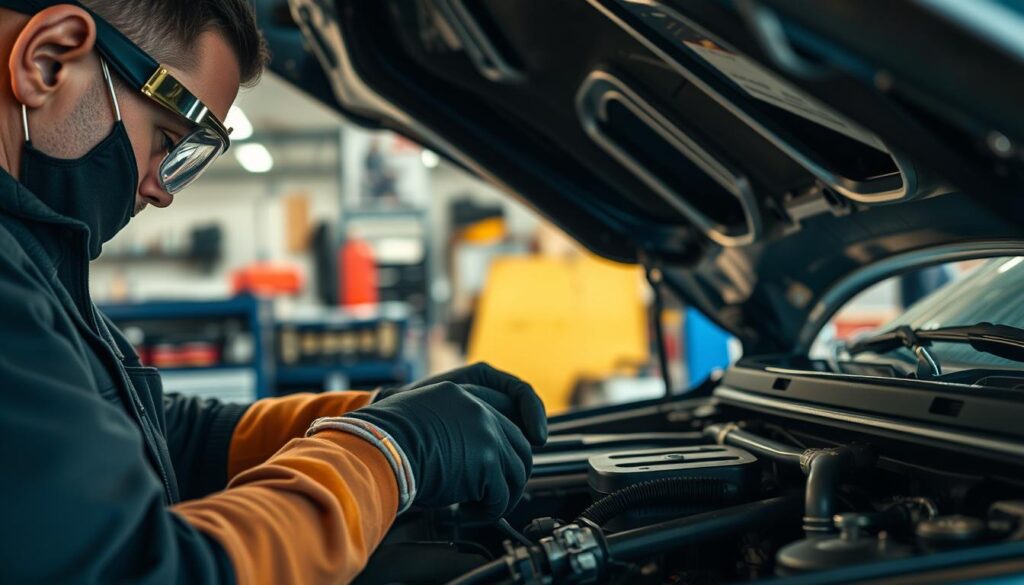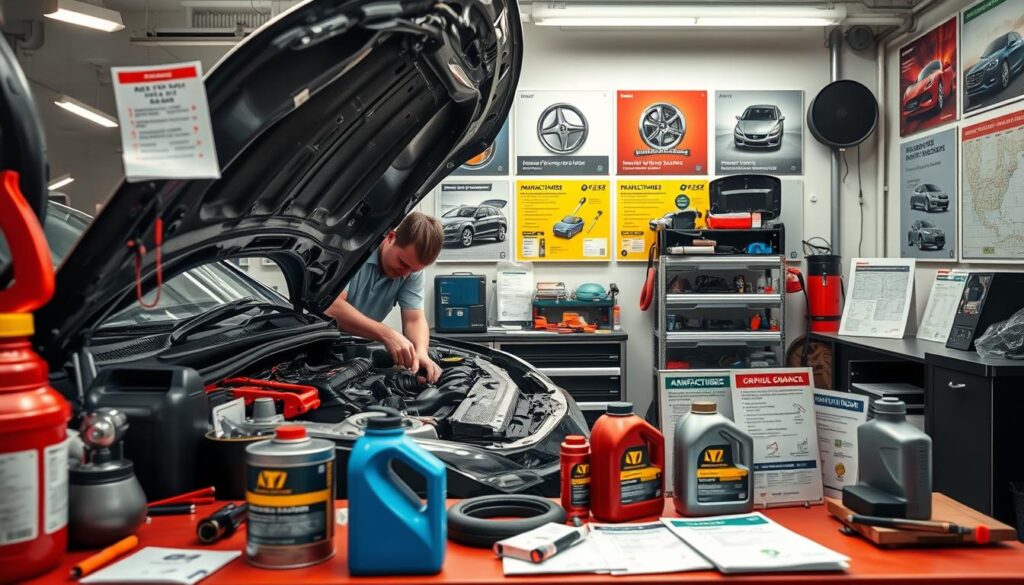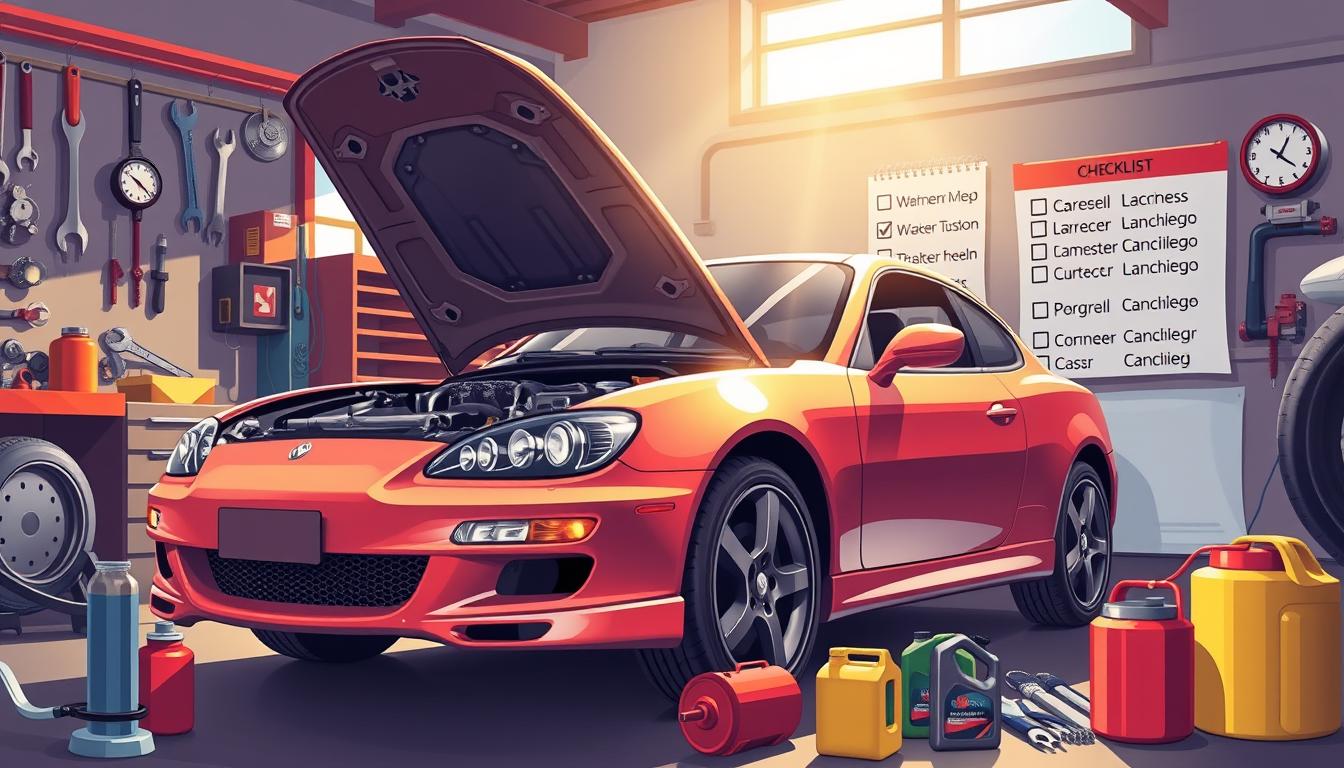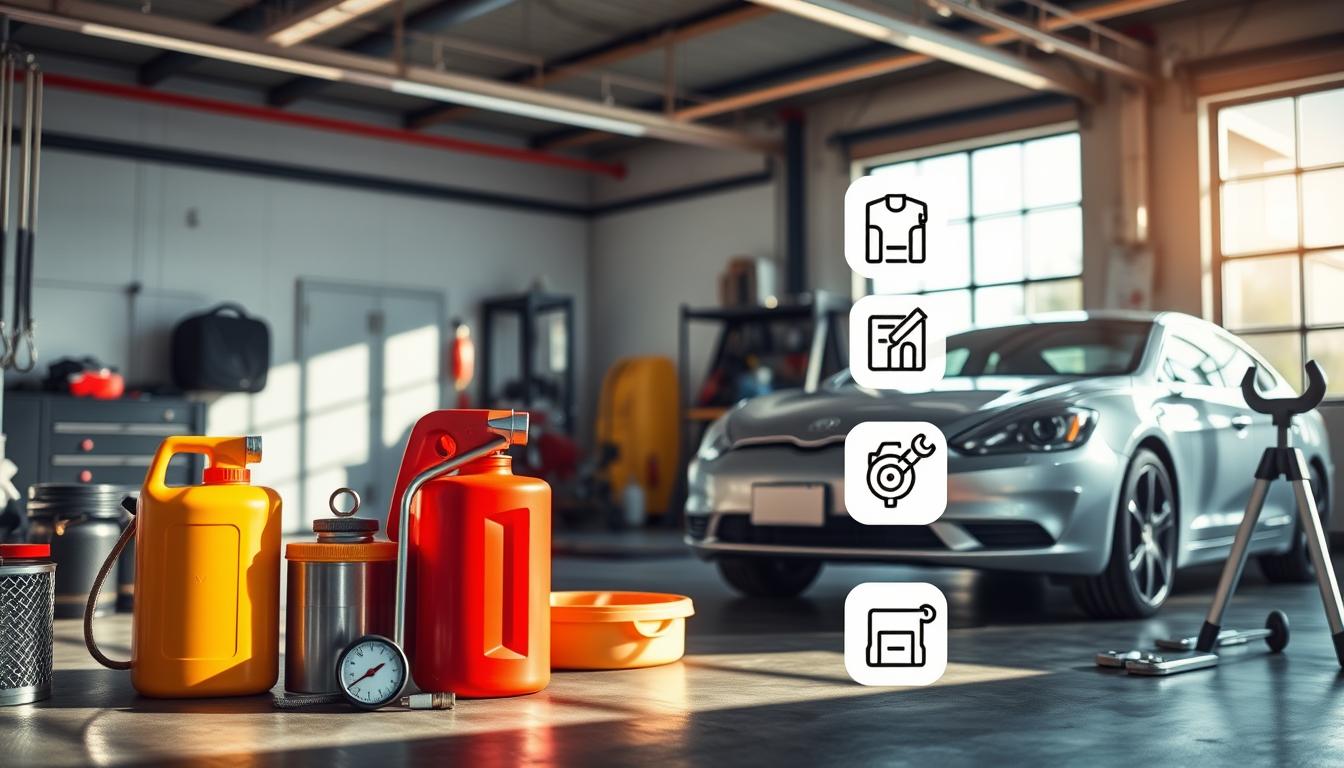We think regular car maintenance is key to making your car last longer. By doing routine tasks and driving smart, you can reduce wear on your car. This includes the engine, transmission, and suspension. Regular maintenance is vital to avoid expensive repairs and stay safe on the road.
In this article, we’ll give you a detailed guide on car maintenance. You’ll learn how to care for your car’s battery, change filters, and drive smoothly. These are important tips for your vehicle maintenance schedule.
By focusing on regular maintenance, you can make your car last longer. Cars that reach 200,000 miles can last up to 20 years longer than those that only make it to 100,000 miles. We’ll talk about the importance of services like oil changes, tire rotations, and brake pad replacements. These are key parts of a good maintenance plan.
Key Takeaways
- Regular car maintenance can extend the life of your vehicle by several years.
- Following a vehicle maintenance schedule can help prevent costly repairs and ensure your safety on the road.
- Car maintenance tips, such as changing filters regularly and driving smoothly, can make a big difference in the longevity of your car.
- Regular oil changes and tire rotations are essential for maintaining your car’s performance and extending its lifespan.
- By prioritizing regular maintenance, you can achieve 10-20% better fuel efficiency and save money on gas.
- Up to 70% of drivers neglect routine maintenance, which can lead to increased risk of breakdowns and costly repairs.
- Creating a vehicle maintenance schedule and sticking to it can help you avoid common pitfalls and keep your car running smoothly for years to come.
Understanding Regular Car Maintenance
Regular car maintenance is key to extend the life of your vehicle and keep it running smoothly. By sticking to a routine auto service schedule, you avoid expensive repairs and boost your car’s performance. We’ll explore the benefits and what’s involved in regular car care.
Looking after your car and keeping it in top shape requires some effort. But, you don’t need to be a car expert to do it. Knowing what maintenance tasks are needed and how often can be the biggest challenge. Tasks like oil changes, tire rotations, and brake pad replacements are essential. They help keep your car in good shape, reduce wear, and save you money on repairs.
What Is Regular Maintenance?
Regular maintenance means doing routine tasks and services on your vehicle to keep it running well. This includes oil changes, tire rotations, and brake pad replacements. By keeping up with these tasks, you can extend the life of your vehicle, enhance its performance, and dodge expensive repairs.
Common Maintenance Tasks
Some common maintenance tasks include:
- Oil changes
- Tire rotations
- Brake pad replacements
- Brake inspections
- Tire pressure checks
These tasks are vital for the long-term benefits of car care. They should be done regularly to ensure your vehicle runs smoothly and efficiently.
The Financial Impact of Maintenance
Regular car maintenance can save us a lot of money. By keeping up with routine tasks, we avoid expensive repairs and don’t need to replace parts too soon. Car maintenance costs can add up, but it’s worth it to save up to 30% on vehicle costs.
One way to cut down on car maintenance costs is to avoid big repairs. Skipping oil changes can damage the engine, costing over $3,000 to fix. But regular oil changes can make the engine last 50% longer. Also, changing a dirty air filter can improve fuel efficiency by up to 10%.
Regular maintenance can lead to long-term savings. Proper tire inflation can save 3% to 5% on fuel. A well-tuned engine can save about 4% on fuel. Plus, a service history can increase a car’s resale value by 15-20%. To get these benefits, it’s key to keep up with routine checks and minor repairs.
Some key ways to reduce car maintenance costs and save money include:
- Regular oil changes
- Proper tire inflation
- Replacing a clogged air filter
- Staying on schedule with routine tasks and services
By following these tips and focusing on regular maintenance, we can dodge big repairs and enjoy the financial perks of a well-kept vehicle.
Enhanced Performance Through Maintenance
Regular car maintenance is key to better performance. By keeping up with routine tasks, we boost fuel efficiency and cut emissions. This makes driving smoother and more enjoyable.
Proper tire inflation and alignment can up gas mileage by 3-5%. Regular maintenance also cuts vehicle costs by up to 30% over its life.
Some key benefits of regular maintenance include:
- Improved fuel efficiency by 10-20% when done regularly
- Extended vehicle lifespan by up to 15 years with proper care
- Lower risk of expensive repairs and better resale value

By focusing on regular maintenance, we boost our vehicle’s performance and save money. Clean oil and a well-running engine mean a smoother ride and more reliability.
Safety First: The Role of Maintenance
When it comes to vehicle maintenance, safety is our top priority. Regular checks can greatly lower the risk of accidents. This is because they ensure brakes and tires work right. For example, choosing the right tires can also save you money on gas.
It’s vital to have regular brake inspections to keep your car stopping safely. In fact, brake failure causes about 30% of vehicle accidents. Also, tire health is key. Properly inflated and aligned tires can make your car use less gas by 3% to 5%.

- Regularly check tire pressure and tread depth
- Inspect brake pads and rotors for wear
- Address small issues early to prevent more severe problems
By focusing on safety and regular maintenance, you can lower accident risks. This way, your vehicle will run well for many years.
Keeping Up with Manufacturer Recommendations
Keeping our vehicles in top shape is key. The owner’s manual is our guide. It tells us what our car needs to stay healthy.
Regular maintenance is vital. Staying on schedule helps avoid expensive repairs. We can check the handbook for service due dates and required work. Modern cars also have dashboard lights for maintenance alerts.
Understanding Your Owner’s Manual
The owner’s manual is full of useful info. It tells us when to change oil, rotate tires, and check brakes. Following these guidelines keeps our car running smoothly and reduces breakdown risks.
Following the manufacturer’s advice has many benefits. These include:
- Extended vehicle lifespan
- Improved fuel efficiency
- Reduced maintenance costs
- Enhanced safety features
By sticking to the service schedule, we get a better driving experience. Our car will perform better and be safer. Remember, regular maintenance is essential for a long-lasting car.

In summary, following the manufacturer’s advice is critical for our car’s health and longevity. By understanding the owner’s manual and staying on schedule, we avoid costly repairs. We also improve fuel efficiency and enjoy a better driving experience.
| Service | Frequency | Benefits |
|---|---|---|
| Oil Change | Every 5,000 miles | Prevents engine wear, improves fuel efficiency |
| Tire Rotation | Every 6,000 miles | Extends tire life, improves handling |
| Brake Inspection | Every 12,000 miles | Ensures safety, prevents brake failure |
Seasonal Maintenance Tips
As we move through different seasons, our cars need special care to stay in great shape. Seasonal maintenance is key to get your vehicle ready for the weather changes. It’s important to do routine tasks and services to keep your car running well and avoid expensive fixes.
In winter, make sure to check your windshield wipers. You might need to switch to winter wiper blades for better performance. Also, check your tire pressure and tread depth to improve traction on icy roads. When spring comes, give your car a good clean to remove winter dirt and debris.
Some important seasonal maintenance tasks include:
- Replacing windshield wipers every 6-12 months or as needed
- Checking tire pressure at least once a month
- Performing a thorough spring cleaning of your vehicle
By keeping up with seasonal maintenance, you ensure your car runs smoothly and safely, no matter the weather. Regular care also boosts fuel efficiency and lowers the chance of expensive repairs later.

Remember, taking care of your car seasonally is a big part of being a car owner. By following these tips and doing routine tasks, you can make your car last longer and keep it in top condition.
| Season | Maintenance Tasks |
|---|---|
| Winter | Check windshield wipers, tire pressure, and tread depth |
| Spring | Perform thorough spring cleaning, check tire pressure, and replace windshield wipers as needed |
The Role of Oil Changes
Regular oil changes are key for your car’s engine health. The oil lubricates, seals, and cools, reducing wear. Staying on schedule helps your engine last longer, saves fuel, and avoids expensive fixes.
Choosing the right oil is vital for your engine’s performance and life. Most cars need oil changes every 3,000 to 5,000 miles. Skipping oil changes can shorten engine life by 40%. But regular changes can boost fuel efficiency by 1-2% each time.
Regular oil changes offer many benefits, including:
- Improved fuel efficiency
- Extended engine life
- Reduced wear and tear on moving parts
- Prevention of costly repairs
It’s clear that picking the right oil and keeping up with changes are essential. With oil changes costing $30 to $100, it’s a small price for avoiding engine repairs or replacement, which can cost over $5,000.
By focusing on oil changes and the right oil, your car will run better, use less fuel, and be safer. Remember, regular care is the best way to keep your car running well and avoid expensive repairs later.
| Oil Change Frequency | Benefits |
|---|---|
| Every 3,000 to 5,000 miles | Improved fuel efficiency, extended engine life, reduced wear and tear |
| Regular oil changes | Prevention of costly repairs, improved engine performance |
Importance of Fluid Checks
Regular fluid checks are key for our vehicles’ long life and performance. They help avoid expensive repairs and keep our cars running well. Experts say that tasks like oil changes and fluid checks boost vehicle reliability.
Checking engine coolant levels is very important. It helps prevent overheating, which can harm the engine. Also, transmission fluid maintenance is essential for smooth gear shifting. If we ignore these fluids, our cars might not perform well and could need costly fixes.
To learn more about getting your car ready for different seasons, check out winter car preparation tips. Regular fluid checks help keep our engines, transmissions, and other important parts in good shape. This saves money and makes driving safer.
The Effect of Neglect on Longevity
Regular car maintenance is key to keeping your vehicle running long. Neglecting it can shorten your car’s life. Signs of neglect might seem small, but they can cause big problems and expensive fixes.
Worn-out brake pads, low tire pressure, and dirty air filters are common signs. These issues can hurt your car’s performance and safety. They might even lead to accidents.
Studies show that regular care can make your car last up to 50% longer. Cars with good maintenance are also 30% less likely to crash. Keeping up with maintenance helps avoid costly repairs and keeps your car running well.
| Regular Maintenance | Benefits |
|---|---|
| Regular oil changes | Increases engine life by up to 40% |
| Timely brake inspections | Reduces risk of brake failure-related accidents by up to 60% |
| Proper tire maintenance | Increases fuel efficiency by 3-5% and decreases likelihood of tire blowouts by 50% |
By focusing on regular maintenance, you can avoid neglect’s bad effects. At our dealership, we want your car to stay in great shape. Whether you need a new or used Ford in Natchitoches, LA, or service, we’re here to assist.
Building a Maintenance Routine
Creating a maintenance routine is key to keeping your vehicle running well. It helps prevent breakdowns and costly repairs. By creating a schedule that fits your life, you can keep up with important tasks. This includes regular oil changes, tire rotations, and brake checks.
Technology can also help you remember when it’s time for maintenance. You can set reminders on your phone or use a maintenance app. This way, you won’t forget important tasks and can avoid breakdowns and repairs.
Some benefits of building a maintenance routine include:
- Extended vehicle life
- Improved fuel efficiency
- Reduced risk of breakdowns and repairs
- Increased safety on the road
By sticking to a maintenance routine and creating a schedule that suits you, your vehicle will run smoothly and safely. Using technology for reminders helps you stay on track and avoid missing important maintenance tasks.
| Maintenance Task | Frequency | Benefits |
|---|---|---|
| Oil Changes | Every 3,000 to 5,000 miles | Improved engine performance and fuel efficiency |
| Tire Rotations | Every 6,000 to 8,000 miles | Improved tire life and fuel efficiency |
| Brake Checks | Every 12,000 miles | Improved safety and reduced risk of brake failure |
Finding a Trusted Mechanic
Finding a trusted mechanic is key to keeping your vehicle in top shape. At Jimmy Granger Ford in Natchitoches, our team is dedicated to top-notch maintenance and repairs. We aim to keep your car running smoothly for years.
What to Look for in a Mechanic
Look for a mechanic who knows their stuff, has lots of experience, and uses quality parts. A good mechanic will be open about what needs to be done, give honest estimates, and back their work with a warranty.
The Benefits of a Good Relationship
Having a good mechanic can really pay off. They’ll know your car’s history, making it easier to fix problems. They’ll also give you tips to keep your car running well and avoid big repairs. Come see us at Jimmy Granger Ford to see the perks of a trusted mechanic.


